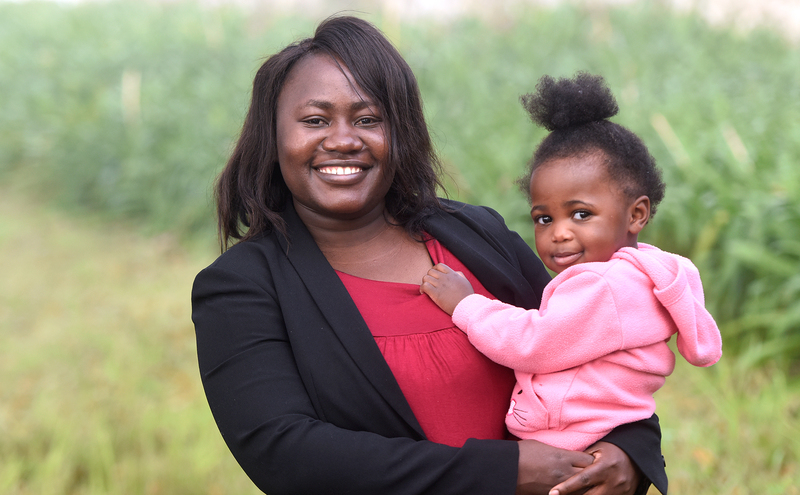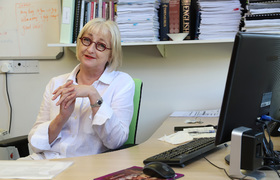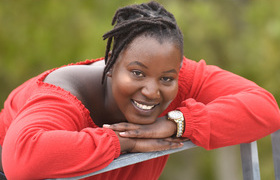‘I carried my notebooks into the delivery room’
11 July 2019 | Story Supplied. Photo Brenton Geach. Read time 6 min.
It would have been easy for master’s graduand Mildreat Muroyiwa to postpone her studies and her dissertation when she found out she was pregnant during her first block at the University of Cape Town’s (UCT) Graduate School of Business (GSB), where she was enrolled to study development finance.
Just two months earlier, her beloved mother, who had raised four children single-handedly after her husband walked out on the family, had died from breast cancer and Muroyiwa’s “pillar of support” would not be there to see her graduate.
Instead, the determined student persevered, overcoming a host of challenges that included carrying her notebooks into the delivery room when she went into labour the Saturday evening before two critical class tests. And at the 12 July graduation ceremony, she will finally collect her coveted master’s degree – which she earned with a distinction.
The youngest of four siblings who were raised in Bulawayo in Zimbabwe, Muroyiwa said it will be a pivotal moment in her life journey.
“Even though my mother had a limited education, she wanted the best for her children and worked hard to make that a reality. So you can imagine it was a very proud moment when I first graduated with a BCom(Hons) in banking and finance and worked in various finance and administrative roles in the Zimbabwean non-government sector.”
Learning and exams
It was the “lived experience of seeing my mother and other women like her that inspired me to work within the development sector, to do whatever possible to positively transform the lives of others like them”, she said of her subsequent decision to relocate to South Africa to study at UCT.
So it was that her unborn baby became part of Muroyiwa’s master’s experience; her classmates even nicknamed the child “Baby MCom”.
“But, as life would have it, I went into labour one Saturday evening before two important class tests that would contribute to my overall course mark.”
Her second block was an intense period of learning and exams, and she hoped the baby would wait her turn.
“But, as life would have it, I went into labour one Saturday evening before two important class tests that would contribute to my overall course mark.
“I so hoped the pain was fake, so much so that I carried my notebooks into the delivery room.”
During her final block, her niece travelled from Johannesburg to babysit while Muroyiwa was in class.
“I would sometimes go back to my rental apartment to feed the baby, or I expressed milk for her during lunch breaks because I was only getting home from school about 8 or 9pm.”
Her daughter, Imani (Swahili for faith), was her constant companion – and so the now 22-month-old will be at her graduation on 12 July, and “must be in the class photo”.
Of her life, Muroyiwa said she has always refused to let others dictate “what I can and cannot do”.
She’s always been the one who dares to prove her case is different when others try to apply stereotypes to her experiences.
Defying the odds
And she believes that is why she persevered – and ended with success – where others may have been intimidated into believing it is impossible to study while pregnant or with a small baby.
For her dissertation, Muroyiwa chose to examine the profitability of savings groups in South Africa.
“This was also driven by the fact that, growing up in Zimbabwe, I’d seen my single-parent mother work with her hands and send four children to school, partly from knitting jerseys but also from her participation in savings groups.
“I was fascinated to study these [savings] groups, and to apply academic research and insight to what makes them successful.”
“I was fascinated to study these groups, and to apply academic research and insight to what makes them successful.”
She said her investigations revealed key insights into how savings groups can be structured and supported.
“Such work resonates with my heart and passion to have instruments that uplift the poorest out of poverty, and savings groups are a financial inclusion tool that could help communities to do so.”
While she has always dreaded statistics, for Muroyiwa’s dissertation there was no dodging the bullet.
“With the support of my supervisors I am glad and overjoyed that I obtained a distinction. It was worth the nights of data analysis!”
She is looking forward to giving back to society after graduation, applying what she has learnt at the GSB to “enable a better world for the girl child”.
“I look to the future with great excitement and anticipation as I work to help transform the world in which we live.”
 This work is licensed under a Creative Commons Attribution-NoDerivatives 4.0 International License.
This work is licensed under a Creative Commons Attribution-NoDerivatives 4.0 International License.
Please view the republishing articles page for more information.










